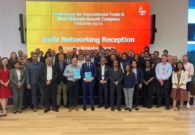UKIBC Roundtable Discussion – Future of Work
In a roundtable discussion kindly hosted by our member, Allen & Overy, the UK India Business Council (UKIBC), and its members, were joined by the University of Liverpool’s Dr Paul Redmond, one of the UK’s leading experts on generational change and the future of work, for a roundtable on bridging the gap between higher education and employers.
The roundtable is the latest development in UKIBC’s higher education work on employability, working towards a key advocacy goal that employability skills for graduates should be a top priority for the Indian Government. We recommend that the Government of India considers UK models to effectively integrate vocational skills with mainstream education – an area in which Dr Redmond is a thought leader.
Tara Panjwani, who manages the Higher Education sector for UKIBC, facilitated the discussion, helping to contextualise Dr Redmond’s valuable insights for the Indian market and drawing upon UKIBC’s own work in this area.
A brief summary of the discussion is below, and a full version is available for UKIBC members.
In the first instance, it was acknowledged that this is the first time we are seeing technology begin to take over ‘white-collar’ jobs – an evolution from earlier industrial revolutions which first saw ‘blue-collar’ jobs being affected. With today’s generation being ‘digital-native’, India will need to seriously consider an ‘ICE Age’, namely an era of Innovation, Creativity, and Enterprise.
Higher education institutions still largely focus on traditional, or 20th Century, methods of teaching (which should not altogether be discarded) when preparing students for a 21st Century workplace. India has an opportunity to lead the way in enhancing teaching methods beneficial to current, and future generation, workforce-ready graduates. In order to do this, and in turn turbo-charge its economy, India will need to:
- Urgently enhance its level of female education at the school and university levels
- Increase its number of female entrepreneurs
- Look at using technology (e.g. via smartphones) to deliver education more widely across the country, such as rural areas which lack the physical presence of schools and colleges
It was agreed that stakeholders need to work together to make significant changes to existing systems and procedures, in order to ensure they are fit for the future. One such strategy discussed was the need for employers across sectors to be the driving force for upskilling students and improving their employability. They must take responsibility and be active agents of change – sharing their knowledge and skill requirements with educational institutions to collaboratively change the curriculum, assessment methods, and traditional mindsets to significantly enhance graduate employability.
This goes to the heart of what employability means – think of it in terms of the wellbeing of a society and then everything will fall into place. Seen from this lens, employability as societal wellbeing will necessitate the coming together of Corporate Social Responsibility (CSR) and University Social Responsibility (USR) to bring about systemic transformation and propel us into the world of the future.
Here at the UKIBC, we champion this ‘employability as social responsibility’ agenda as part of our ongoing Higher Education work. To find out more please contact tara.panjwani@ukibc.com

 By Tara Panjwani
By Tara Panjwani 




